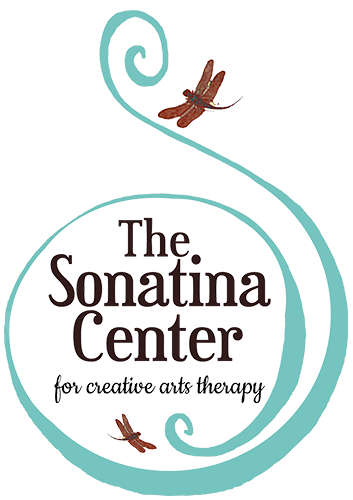What to Expect from Music Therapy (By: Emme Hooks)
Music therapy sessions are an engaging and motivating place for clients to explore and develop themselves in collaboration with a music therapist. Rooted in shared musical experiences, music therapy provides opportunities for connection, self-exploration, self-expression, and learning. At the Sonatina Center, we approach therapy from a culturally and contextual-centered lens, which means all of our therapists place your identities, interests, lived experiences, and personal goals at the center. As a justice-based practice, we are committed to an open and affirming practice, radically supporting marginalized clients, supporting independence and autonomy, and committed to social justice. We have accessible entrances, an accessible and gender inclusive restroom, and a changing table to allow full use of the center by all people. If our practice is a good fit for you, this is what you can expect when inquiring about music therapy sessions.
Following an initial request and phone consultation, you’ll be connected with one of our music therapists based on their clinical expertise and your desired areas of support. Starting a relationship with a new therapist can evoke many emotions: excitement, anxiety, fear, curiosity. That is normal! You or your loved one's first several sessions are about building a relationship, establishing trust, and exploring a variety of creative experiences. After your first session(s), your therapist will use their evaluation to collaborate with you to create individualized goals that are meaningful, accessible, and easily transferable to daily life. These goals help guide the experiences, discussions, and self-development that emerge in sessions.
Image Description (from Left to Right): Hanging on a white wall is an off-white drum head, a tan acoustic guitar, and a two-tiered shelf with a large potted fern on the bottom and a smaller on top.
If you are unsure about exactly what music therapy entails, here are a few examples of experiences you might have in session. To increase emotional expression, one might experiment with playing instruments to communicate and express themselves through music. They may try songwriting with the support of their therapist. An individual interested in increasing their coping skills could explore listening and making music for mood regulation and a healthy energy release. No matter your musical experience or hopes for therapy, your therapist will prioritize your preferences to create opportunities for musical, verbal, and artistic expression.
Like other therapy practices, it takes time to create meaningful change. Learning (or unlearning) is not always an easy task. Have patience with yourself, your loved one, and your therapist. Celebrate the small victories. In time, the small changes add up. Your therapist reflects with you on your exploration and growth in a written progress note every quarter. These summaries highlight your journey in therapy and offer possibilities for your next steps forward.
A therapeutic relationship is always changing, and you are your best advocate. We welcome your suggestions, ideas, and hopes at every point in the therapeutic process. Our goal is to collaborate with you to create opportunities for growth and development. We use our clinical expertise to develop meaningful shared experiences for people of all ages, abilities, interests, and backgrounds. Your therapist is there to guide your path towards transformation. You are the most powerful source for change in your own life and we hope to see you in our office soon.
If you’d like to see a virtual tour of our office, visit bit.ly/SonatinaTour.

